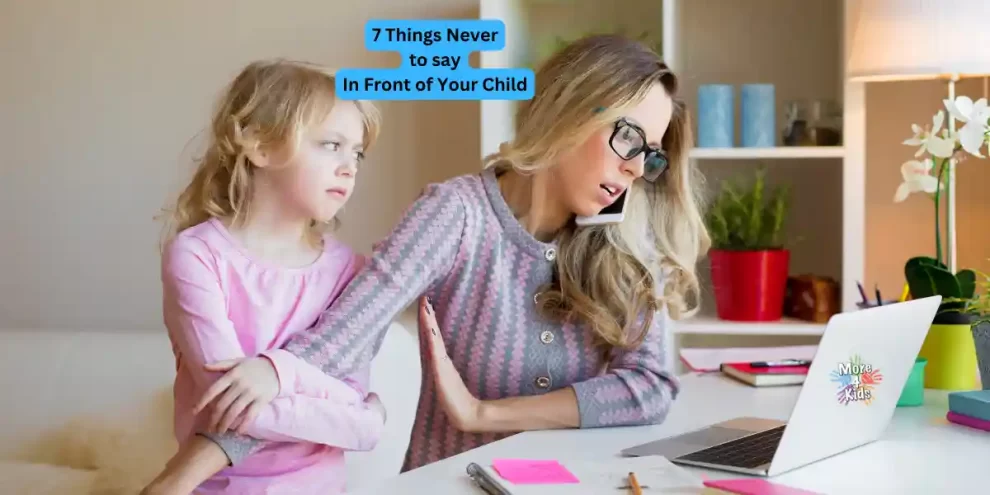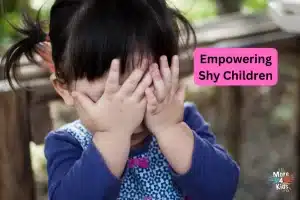Parents always examine what they can say to their children to ensure they grow up confident, smart, compassionate, and well-adjusted. But sometimes, we forget to think about what we shouldn’t be saying in front of them. Despite the years I’ve spent writing about parenting and the dynamics of parent-child relationships, I’m guilty of this, too.
Recently, I was frustrated because my weight has been creeping up since I hit middle age. I had somewhere I needed to be, and I couldn’t find any outfit in my closet that didn’t instantly betray the fact that my metabolism had come to a screeching halt. I made some remark about how I looked ginormous in every outfit I owned. The second I saw the look on my teen daughter’s face, I instantly regretted my choice of words and their implications. So, this list of things to never say in front of your child will kick off with my ill-advised comment.
7. Parenting Communication Tips
Table of Contents
1. “I Look So Fat”
Hopefully, most parents are smarter than I was about this statement. Other than this one time, I don’t recall ever saying anything like it. In the past, I’ve said I wanted to get fitter for health reasons, which is a healthy statement, and I stand by it.
But never before have I ever criticized my own appearance so harshly in front of my daughter. And I have to admit, it was a colossal mistake. My daughter has often complimented me on my appearance, and it’s evident she thinks I look at least as good as any other middle-aged mom. With this one careless comment, I gave my daughter the impression that it was okay to evaluate my self-worth based on my weight, and that’s something I hope she never does.
2. “I Give Up”
Fortunately, quitting – at least without a good reason – isn’t in my vocabulary. I never tell my kids that I give up on anything I’m doing. I always tell them just the opposite, saying I’m too legit to quit, and then I usually do some lame 1980s dance to emphasize my point and my energy level. They groan, and we all laugh, but I know my point is being made.
To this day, I’ve never heard my kids say they give up. Whether they’re doing a complicated math problem or trying to write computer code, they keep trying until they get it right.
3. “You’re Acting Like a Baby”
The intent of this phrase is all over the map – some parents say it to shame their children. Others say it in the hopes of modifying a behavior they see as embarrassing, undesirable, or annoying. But no matter the intent, nothing good can come out of saying this.
All it will do is upset your child. Instead of saying this hurtful phrase, try asking your child why they are upset. They could feel overwhelmed and stressed out or feel they have no say in something that affects them. Talking to your child instead of aggressively trying to shame them is the better course to take.
4. “You’re the Man of the House”
When my husband leaves on business trips, he will occasionally tell our son to make him proud and that he’ll be the man of the house until he returns home. He knows I’m not a fan of this statement, and neither is my daughter.
I know the intent of this phrase isn’t negative, but it puts a lot of pressure on the boy it’s directed toward, as if it is his sworn duty to troubleshoot any problem and ensure everyone stays protected and healthy on his watch. That’s a tall order for anyone, let alone a kid.
My daughter is less worried about the pressure her brother feels when he’s told this. She’s more offended that it reinforces archaic gender roles about a man being in charge of a household when a woman can be just as capable.
5. “Stop Crying”
Telling children – even teens – to stop crying is useless and potentially harmful. Expressing sadness or frustration through tears is nothing to be ashamed about – it’s a natural reaction. It’s okay to show that you have feelings. Sometimes, expressing them can make someone feel better.
A better thing to tell your child is, “It’s okay to cry if you need to. Let it out, and then move on.”
6. “I Don’t Have Time for This”
In today’s society, parents are super busy. Even if we’re not doing anything particularly important, we can still feel extremely overworked. Our phone notifications go off at all hours, and our to-do list never seems to end. When you’re frantically trying to handle after-hours work emergencies, making dinner, and juggling other tasks, you might inadvertently say this phrase to your child when they approach you for homework help or start to tell you about the drama that unfolded at school that day.
But what your child will hear when you say this is that you don’t have time for them. That can hurt, and they can take it to mean you don’t value hearing anything about their days or lives, ever.
Instead, if you’re doing something that absolutely can’t wait, tell your teen you’re dealing with something time-sensitive and you’d love to help them with their issue or hear about their day as soon as you can take care of that one task. Then, make sure to follow through as soon as you can.
7. “Shut Up”
I’ve always hated this phrase, especially when adults say it to children as if they don’t have feelings. When my kids were young, they were banned from saying shut up to each other because they knew I considered it rude.
It was such a taboo thing to say in my household that my oldest child came home from school one day when he was in first grade and told me another kid at school had used the “Sh” word. I was shocked and wondered who would teach their child that kind of language in first grade. I eventually learned that my son had heard a child at school tell someone else to shut up, and I was glad to know that’s what he meant by the “Sh” word.
My beef with this phrase is that it dismisses the other person’s right to communicate and insinuates what they are going to say isn’t important. If you want to effectively communicate with others and teach your children to do the same, you should never say this phrase in front of your children to anyone.
FAQs: Positive Parenting and Communication
What are some common phrases parents should avoid saying to their children?
Avoid phrases that criticize appearance, express defeat, shame emotions, impose gender roles, discourage expression of feelings, or make the child feel unimportant.
How can I encourage positive self-esteem in my child?
Focus on positive affirmations, validate their feelings, and avoid negative comments about appearances or abilities. Encourage their efforts rather than just results.
What’s a healthy way to handle a child’s emotional outbursts?
Rather than telling them to stop crying or reprimanding them, try to understand the reason behind their emotions and offer support and guidance.
How can I balance being busy with attentive parenting?
Communicate openly about your availability, ensure your child knows they’re a priority, and set aside dedicated time to listen and engage with them.
Why is it important to avoid phrases like ‘the man of the house’?
Such phrases can create unnecessary pressure and perpetuate outdated gender roles. Instead, focus on shared responsibilities and equality within the family.














Add Comment